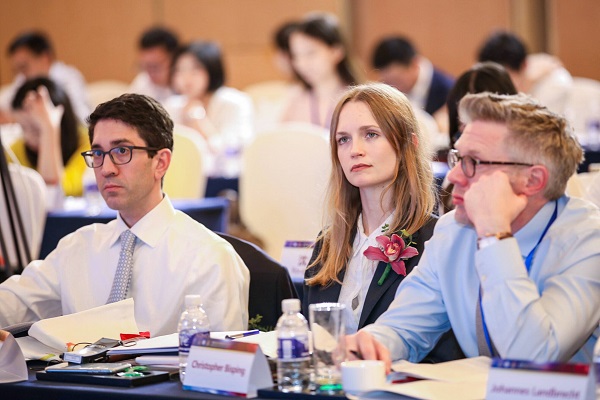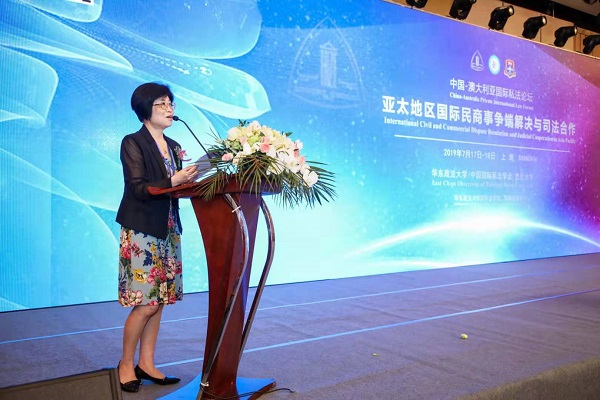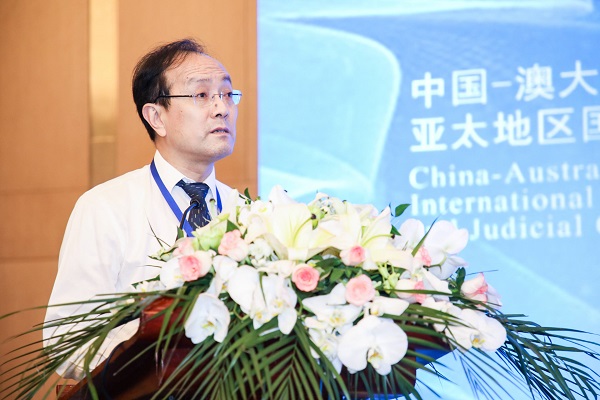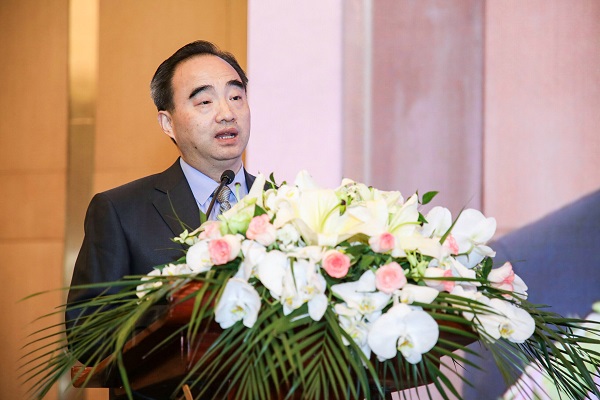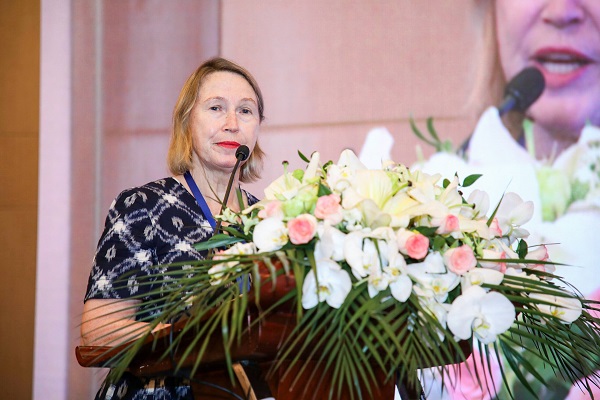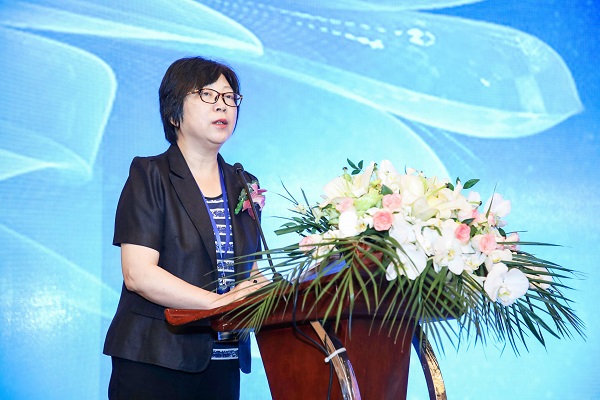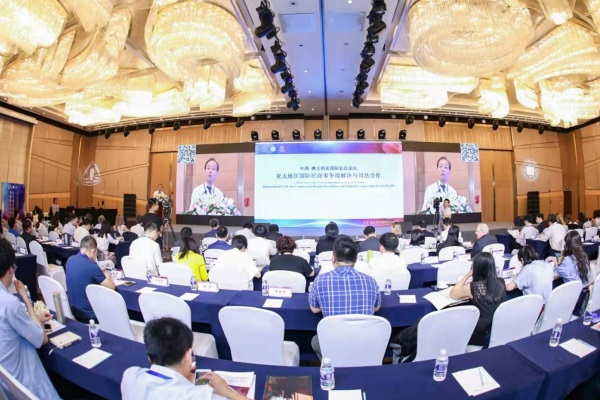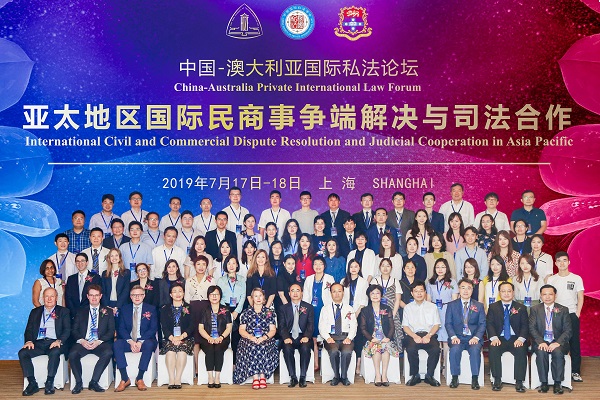On July 17, the 2019 China-Australia Private International Law Forum was held in Hongkou District, Shanghai. The forum was sponsored by ECUPL, the China Society of Private International Law (CSPIL), and the University of Sydney Law School, and run by the School of International Law and the International Law Research Center at ECUPL. There were more than 100 legal experts, scholars, practicing judges and lawyers participating in this forum, both from China and abroad.
From June 18 to July 2, the 22nd Diplomatic Meeting of the Hague Conference on Private International Law was held in Hague, the Netherlands. The meeting was held to negotiate the adoption of the Convention on the Recognition and Enforcement of Foreign Judgments in Civil or Commercial Matters, which will have a far-reaching impact on judicial cooperation in international civil and commercial affairs. Against this context, the forum was centered around four topics: the Hague Judgments Convention; International Commercial Arbitration and Alternative Dispute Resolution (ADR); the Application of Law; and the International Commercial Court System. It aimed to further study and understand the roles and prospects of the Convention in the Asia-Pacific region. Another aim was to promote the establishment of the rule of law in the Belt and Road Initiative, to enhance the mutual trust and cooperation of international jurisdiction, to deepen multilateral academic research, and to facilitate the friendly settlement of international civil and commercial disputes.
The opening ceremony of the forum was moderated by Professor Chen Jingying, Vice President of ECUPL. President Ye Qing of ECUPL, President Huang Jin of CSPIL, and Professor Vivienne Bath from Law School, University of Sydney addressed the opening ceremony.
On behalf of the organizers, Professor Ye Qing expressed his gratitude to all the distinguished guests for their participation. He emphasized the value of the forum’s topics and gave an introduction to ECUPL’s history, as well as the strength of the university’s faculties and foreign exchanges.
Professor Huang Jin pointed out that under the current global circumstances, we must follow the path of multilateralism and adhere to the principle of achieving shared growth through discussion and collaboration. Upon this basis, Jin said, we should establish a more just and reasonable settlement system for international civil and commercial disputes.
Professor Vivienne Bath mentioned that both China and Australia have great enthusiasm for developing long-term cooperative ties, and that this forum has provided an excellent platform for settling international disputes in the Asia-Pacific region.
The speeches and discussion sessions at the event focused on five themed sections: Keynote Speech, The Hague Negotiation Convention, International Commercial Arbitration and Alternative Dispute Resolution (ADR), the Application of Law, and the International Commercial Court System. Together, we explored common legal issues in the current process of building multilateral judicial cooperation in the field of private international law.
The Keynote Speech section was presided over by Professor Lin Yanping, the Vice President of CSPIL and the Director of the International Law Research Center at ECUPL. Professor Huang Jin shared five new developments in international investment and trade dispute settlement, namely, the combination of dispute settlement and dispute prevention, the interaction and integration of dispute settlement systems, the judicial reform of international investment arbitration, the transnational enforcement of international commercial mediation agreements, and the global circulation of civil judgments. Professor Vivienne Bath hoped that the signing of international conventions could harmonize jurisdiction disputes between courts, so as to facilitate the resolution of disputes among offshore group companies. From the perspective of the Shanghai Financial Court, Xiao Kai, its Vice President, put forward three major problems in China’s foreign financial trials: judicial competition, time-consuming procedures and an imperfect system for group financial disputes. Xu Guojian, a member of the Chinese Government Negotiating Delegation for the Hague Judgments Convention and the Director of Boss & Young Attorneys at Law, stressed that multilateralism is the core value for recognizing and implementing the new Hague Judgments Convention, and the global circulation of foreign judgments is the key phrase of the Convention. Guo Junxiu of the General Counsel of China Eastern Airlines and President of China Aviation Law Society said that the common private international law issues encountered by airlines are employee protection, passenger protection and responsibility identification. Wang Weijun, the Deputy Secretary-General of the Shanghai International Economic and Trade Arbitration Commission (Shanghai International Arbitration Center), spoke of the trend of resolution systems for international commercial disputes merging together, and she also suggested that we should encourage the individual development of different dispute resolution methods.
The Hague Judgments Convention section of the Forum was chaired by Professor Wang Guohua, the Dean of the Law School of Shanghai Maritime University and the Vice President of CSPIL. Professor Yuan Faqiang from ECUPL’s School of International Law believed that the significance of joining the Hague Convention for China was not to consider the meaning of the foreign recognition of China’s judgments, but instead what we need to consider more was the recognition and enforcement of the judgements of Chinese courts in foreign countries. Associate Professor Huang Jie, from Law School, University of Sydney, deemed that Australian common law provided relatively liberal suitable conditions for the enforcement of overseas judgments, but that not all fields could benefit from this enforcement. Australian attorney Greg Laughton noted that both China and Australia were more willing to recognize and enforce the decisions of both countries on the basis of reciprocity after the China-Australia Free Trade Agreement came into force in 2017. Dr. Qian Zhenqiu from the School of Law at Wuhan University discussed how there were no contradictions between common court provisions and China’s existing legal regulations and practice, but currently the regulations of the new convention on common courts were still not detailed and transparent enough. According to Poomintr Sooksripaisarnkit, a lecturer at the Law School of the University of Tasmania, the new convention did not promote the development of the above factors in terms of commercial certainty or predictability of legal consequences.
Professor Tu Guangjian from the Faculty of Law of the University of Macau hosted the International Commercial Arbitration and Alternative Dispute Resolution (ADR) section. Zhou Bo, the Director of the law firm Wintell & Co, mentioned that China’s arbitration systems kept changing to meet the international standards, and that a judicial investigation of China’s arbitration law showed a state of migration. Li Jianzhong, a Professor at the School of Law of Hangzhou Normal University, thought that we could attempt to construct a temporary arbitration system in the free trade zone by suspending the application of Articles 16 and 18 of the Arbitration Law, establishing discretion in arbitration tribunals and clarifying the necessary qualifications for arbitrators. Dilyara Nigmatullina, a postdoctoral researcher at the School of Law of the University of Antwerp, used a data comparison to emphasize that the combination of mediation and arbitration was a crucial current trend in dispute settlement. PhD student Zhang Junmin from the School of Law at Maastricht University argued that once the interim measures had been made by the emergency arbitrator, they could be deemed as a de facto final judgement. Professor Chen Li, Associate Dean of the School of Law at Fudan University, gave a speech on the new problems concerning the recognition and enforcement of foreign arbitral rulings in China under the New York Convention. He also raised some new issues with regards to where the arbitral verdicts originate from, the testing of foreign factors in said verdicts, and their enforcement involving hostile governments. Liu Guiqiang, a PhD student at the School of Law of Wuhan University, said that the reason why Chinese judicial authorities refused to perform extraterritorial forensics was due to the lack of information in the request letter, and the lack of a translated version.
Associate Professor Huang Jie of the School of Law of the University of Sydney presided over the section on the Choice of Law in International Commercial Transactions. Ling Bing, a professor from Law School, University of Sydney, said that there were three main factors which affected each party’s choice of governing law, namely the predictability of the law, the adaptability to the type of contract and the familiarity with the legal system involved. Professor Walter Doralt from the Law Department of Graz University in Austria believed that the choice of law should place importance on protecting consumers better in cross-border electronic commerce. Brooke Adele Marshall, a lecturer from the Faculty of Law at the University of New South Wales in Australia, stated that that it was necessary to reform the Australian Conflict of Contract Law because of the difficulty and ambiguity of choice of law, and the courts’ lack of familiarity with choice of law in particular areas. Dr. Yi Weng from the School of Law at the University of Manchester in the UK argued that currently, China’s Conflicts Law could not meet the dispute resolution needs of cross-border insurance contracts, and the policies of weaker party protection were not reflected in the insurance contract and jurisdiction issues. Wang Donghong, a lawyer from Jingshi Law Firm, pointed out that divorce judgments which were recognized in China were limited to the dissolution of marriage but did not involve problems with property. For handling property, she also believed that a single treatment model which did not distinguish personal property from real estate could be used when the property’s nature and value could be ascertained. Dr. Zhang Shuping, from the School of Law at Zhongnan University of Economics and Law, pointed out that the changes in the foreign law identification system were reflected in the addition of enterprises and citizen law firms to the subject, and introducing third-party law identification platforms as a new means of identification. Associate Professor Xu Kai from the School of International Law at ECUPL deemed that the scope of conflicts stipulated in 2010 in Article 26 of the Law of the People’s Republic of China on the Application of Law was too broad. It should be restricted in divorce agreements rather than in divorce by consent, because there was no room for the parties to choose the requirements for the registration to take effect, and should entirely rely on the law of the local country.
Professor Ling Bing from Law School, University of Sydney hosted the section on the International Commercial Court System. Christopher Bisping, an associate professor at the School of Law and Social Science at the University of Warwick in the UK, thought that the international commercial courts faced some real difficulties with regard to the division of jurisdiction, the boundaries of choice of law and the enforcement of judgements. Sai Ramani Garimella, an Assistant Professor of the Law Department of the South Asian University in India, mentioned that the challenges which India faced in resolving international commercial disputes were the excessive time it took to handle cases, the high cost of hearings and the inadequate infrastructure in commercial courts. Elena Alina Onţanu, an Assistant Professor at the School of Law of the Erasmus University Rotterdam in the Netherlands, noted that international commercial courts encountered challenges with regard to insufficient court expertise and the need for a shared language for international proceedings and jurisdiction, and all these issues must be taken into account in order to optimize cross-border litigation processes. Dr. Georgia Antonopoulou from the Erasmus University Rotterdam School of Law talked about how the International Commercial Courts have an international nature, limited jurisdiction and a certain degree of autonomy. Johannes Landbrecht, a postdoctoral fellow at the University of Fribourg, Switzerland, introduced the differences in jurisdictional issues between the Brussels Regime and the new Hague Judgments Convention using the injunction as an example. Dr. Christopher Germann of Webster University in Switzerland mentioned the application of legal rules and other social rules in international commercial disputes, and suggested that we need both diversity and stability. Professor Du Tao, the Associate Dean of the School of International Law at ECUPL, explained the basic situation of China’s commercial courts in terms of their composition of members, their ‘one-stop’ style and the internal expert committee. He also discussed how the establishment of international commercial courts in every region might lead to unfair competition and monopolies in courts.
The closing ceremony was presided over by Zhang Guoyuan, Associate Dean of the School of International Law at ECUPL. Speeches of thanks were also made by Du Tao, the Associate Dean of the ECUPL School of International Law, Lin Yanping, the Vice President of CSPIL, and Ling Bing, Professor at Law School, University of Sydney.
In his speech, Professor Du Tao thanked all the delegates for coming and hoped that this forum could continue to be held in the future. Professor Lin Yanping summarized that this forum focused on new issues in the resolution of international commercial disputes, which fully reflect the new integration of Chinese civil law and common law systems in the field of court arbitration, and also explored new ways of keeping legal services up to date. Professor Ling Bing expressed his gratitude to the organizers at ECUPL and CSPIL for their meticulous planning of this successful forum. Additionally, he thanked the domestic and foreign experts, scholars, and practitioners, as well as the faculty and support team at ECUPL, and looked forward to seeing them again at next year’s forum.
The forum focused on the new situation and new demands of current international trade. It was an important step for the School of International Law at ECUPL in the continuing work to cement this forum as a platform for international academic cooperation and to support our high-level international exchange programs.

